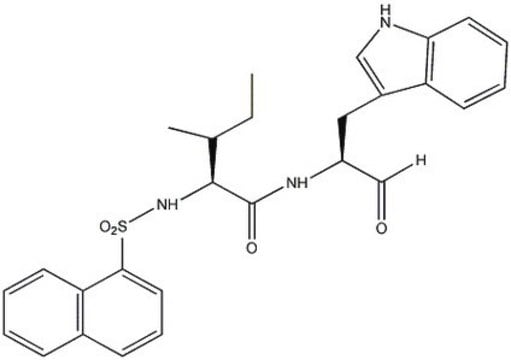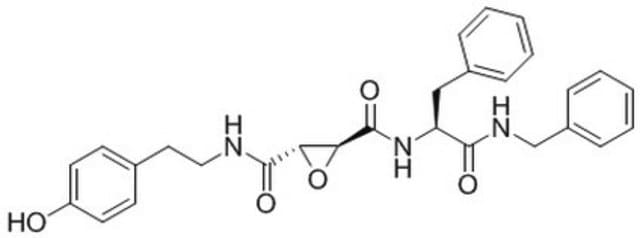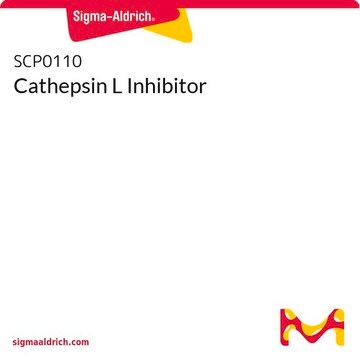219427
Cathepsin L Inhibitor III
The Cathepsin L Inhibitor III controls the biological activity of Cathepsin L. This small molecule/inhibitor is primarily used for Protease Inhibitors applications.
Sinónimos:
Cathepsin L Inhibitor III, Z-FY( t-Bu)-DMK, Z-FY(t-Bu)-DMK
Iniciar sesiónpara Ver la Fijación de precios por contrato y de la organización
About This Item
Fórmula empírica (notación de Hill):
C31H34N4O5
Peso molecular:
542.63
UNSPSC Code:
12352200
NACRES:
NA.77
Productos recomendados
Quality Level
assay
≥98% (TLC)
form
solid
manufacturer/tradename
Calbiochem®
storage condition
OK to freeze
protect from light
color
white to light yellow
solubility
DMSO: 5 mg/mL
shipped in
ambient
storage temp.
−20°C
General description
An irreversible inhibitor of Cathepsin L (Cat. No. 219402). About 10,000-fold more effective against cathepsin L than cathepsin S.
An irreversible inhibitor of Cathepsin L (Cat. No. 219402). About 10,000-fold more effective against cathepsin L than cathepsin S.
Biochem/physiol Actions
Cell permeable: yes
Primary Target
Cathepsin L
Cathepsin L
Product does not compete with ATP.
Reversible: no
Warning
Toxicity: Standard Handling (A)
Sequence
Z-Phe-Tyr(t-Bu)-diazomethylketone
Reconstitution
Following reconstitution, aliquot and freeze (-20°C). Stock solutions are stable for up to 2 weeks at -20°C.
Other Notes
Shaw, E., et al. 1993. FEBS Lett. 334, 340.
Legal Information
CALBIOCHEM is a registered trademark of Merck KGaA, Darmstadt, Germany
Storage Class
11 - Combustible Solids
wgk_germany
WGK 1
flash_point_f
Not applicable
flash_point_c
Not applicable
Certificados de análisis (COA)
Busque Certificados de análisis (COA) introduciendo el número de lote del producto. Los números de lote se encuentran en la etiqueta del producto después de las palabras «Lot» o «Batch»
¿Ya tiene este producto?
Encuentre la documentación para los productos que ha comprado recientemente en la Biblioteca de documentos.
Los clientes también vieron
Qi Feng Lin et al.
Journal of virology, 97(10), e0082823-e0082823 (2023-09-25)
Reoviruses infect many mammals and are widely studied as a model system for enteric viruses. However, most of our reovirus knowledge comes from laboratory strains maintained on immortalized L929 cells. Herein, we asked whether naturally circulating reoviruses possess the same
Xiaoxun Li et al.
Theranostics, 11(20), 9821-9832 (2021-11-25)
Background: Bone metastasis is a frequent symptom of breast cancer and current targeted therapy has limited efficacy. Osteoclasts play critical roles to drive osteolysis and metastatic outgrowth of tumor cells in bone. Previously we identified CST6 as a secretory protein
Yongmei Liu et al.
Journal of virology, 97(9), e0060123-e0060123 (2023-09-07)
Canine coronavirus-human pneumonia-2018 (CCoV-HuPn-2018) was recently isolated from a child with pneumonia. This novel human pathogen resulted from cross-species transmission of a canine coronavirus. It has been known that CCoV-HuPn-2018 uses aminopeptidase N (APN) from canines, felines, and porcines, but
Swetha Mohan et al.
Molecular neurodegeneration, 16(1), 51-51 (2021-08-05)
Progranulin loss-of-function mutations are linked to frontotemporal lobar degeneration with TDP-43 positive inclusions (FTLD-TDP-Pgrn). Progranulin (PGRN) is an intracellular and secreted pro-protein that is proteolytically cleaved into individual granulin peptides, which are increasingly thought to contribute to FTLD-TDP-Pgrn disease pathophysiology.
Cong Zeng et al.
bioRxiv : the preprint server for biology (2021-06-09)
Severe acute respiratory syndrome coronavirus 2 (SARS-CoV-2) is a highly transmissible coronavirus responsible for the global COVID-19 pandemic. Herein we provide evidence that SARS-CoV-2 spreads through cell-cell contact in cultures, mediated by the spike glycoprotein. SARS-CoV-2 spike is more efficient
Nuestro equipo de científicos tiene experiencia en todas las áreas de investigación: Ciencias de la vida, Ciencia de los materiales, Síntesis química, Cromatografía, Analítica y muchas otras.
Póngase en contacto con el Servicio técnico









